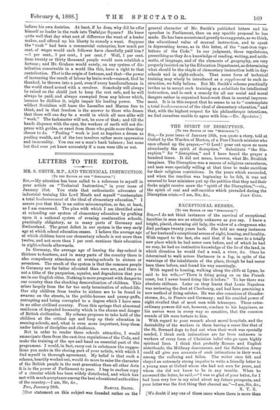LETTERS TO THE EDITOR.
MR. S. SMITH, M.P., AND TECHNICAL INSTRUCTION.
[To THE EDITOR OF THE " $PECTITOli."]
SIB,—My attention has been called to a reference to myself in your article on "Technical Instruction," in your issue of January 21st. You state that enthusiastic advocates of industrial training like Lord Meath and myself "contemplate a total bouleversement of the ideal of elementary education." I assure you that this is an entire misconception, so far, at least, as I am concerned. The plan with which I am identified aims at extending our system of elementary education by grafting upon it a national system of evening continuation schools, practically obligatory, as in many parts of Germany and Switzerland. The great defect in our system is the very early age at which school education ceases. I believe the average age at which children leave our elementary schools is not more than twelve, and not more than 1 per cent. continue their education in night-schools afterwards.
In Germany, the average age of leaving the day-school is thirteen to fourteen, and in many parts of the country there is also compulsory attendance at evening-schools to sixteen or seventeen. The result of the system is that the common people in Germany are far better educated than ours are, and there is not a tithe of the pauperism, squalor, and degradation that you see in our English cities. Nothing is more pregnant with danger to our country than the shocking demoralisation of children. This arises largely from the far too early termination of school-life. Our city children from twelve to sixteen are to be found in swarms on the streets, in the public-houses and penny-gaffs, corrupting and being corrupted to a degree which I have seen in no other civilised country. From this springs that abnormal residuum of degraded humanity which is the shame and danger of British civilisation. My scheme proposes to take hold of the children at the critical age and keep up their education in evening-schools, and, what is even more important, keep them under habits of discipline and obedience.
But in order to render these schools attractive, I would emancipate them from the cast-iron regulations of the Code, and make the training of the eye and hand an essential part of the programme. I would, in fact, carry out in substance the sugges- tions you make in the closing part of your article, with which I find myself in thorough agreement. My belief is that such a scheme, heartily worked out, would do more to raise the character of the British people in the next generation than all other Acts it is in the power of Parliament to pass. I beg to enclose copy of a circular which has been widely distributed, and which has met with much acceptance among the best educational authorities of the country.—I am, Sir, &c.,
Pau, January 28th. SAMUEL Smrfir. [Our statement on this subject was founded rather on the
general character of Mr. Smith's published letters and his speeches in Parliament, than on any specific proposal he has made. He has been accustomed greatly to exaggerate, as we think, the educational value of manual instruction, and to speak in deprecating terms, as in this letter, of the "cast-iron regu- lations of the Code." In our judgment, those regulations, prescribing as they do a knowledge of reading, writing, and arith- metic, of language, and of the elements of geography, are very properly insisted on by the Education Department, as determining what should be the staple of elementary instruction both in day- schools and in night-schools. That some form of technical training may wisely be introduced as a supplement to such in- struction, we fully believe. Bat Mr. Smith's scheme practically invites us to accept such training as a substitute for intellectual instruction, and to seek a remedy for all our social and moral dangers rather in organised hand-work than in mental improve- ment. It is in this respect that he seems to us to "contemplate a total bouleversement of the ideal of elementary education," and that, with the highest respect for his philanthropic intentions, we find ourselves unable to agree with him.—En. Spectator.]


































 Previous page
Previous page